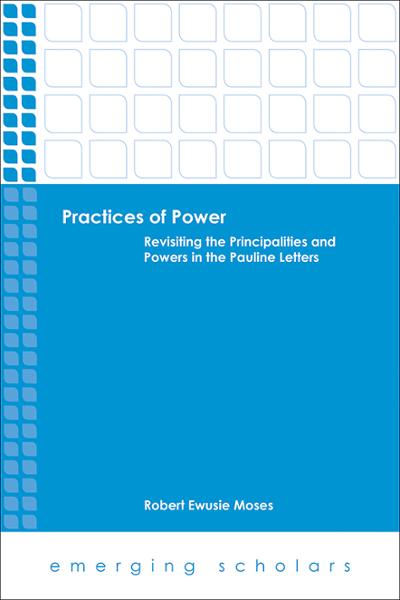- Format Paperback
- ISBN 9781451476644
- eBook ISBN 9781451479935
- Pages 272
- Emerging Scholars category Bible
- Dimensions 6 x 9
- Publication Date April 1, 2014
Contents
1. Introduction
Part 1: Hermeneutical Issues
2. Four Models for Interpreting the Powers
3. A Proposed Way Forward: Practices
Part 2: Practices for Engaging the Powers in the Pauline Communities
4. Baptism as Deliverance from the Powers: Romans
5. Cross-Centered Preaching and Church Discipline as Confrontation with the Powers: 1 & 2 Corinthians
6. Bondage under the Elements: Galatians
7. Rescue from the Power of Darkness: Colossians
8. Summary: What are the Powers for Paul?
Part 3: A Cross-cultural Perspective
9. The Powers in Cross-Cultural Context: Africa
Reference Works
Bibliography
Endorsements
“Robert Ewusie Moses here offers two fresh and illuminating angles of vision on the principalities and powers in Paul’s letters: an invigorating examination of the actual practices of Paul’s churches, and an African perspective on practices and the powers. This approach rightly highlights Paul’s own concerns for the communal life and witness of his congregations, and supplies urgently needed traction for engaging the language of power in the Pauline letters. Rich in exegetical insights, Practices of Power is a must-read for serious Paul scholars.”
—Susan Eastman
Duke Divinity School
"Paul’s theology of 'the powers' is notoriously difficult terrain. With hermeneutical self-consciousness and exegetical skill, Robert Ewusie Moses focuses on the practices which Paul considered either to cede or to deny authority to 'the powers' and 'rulers of this age'—those barely describable threats that pervade all spheres of reality. With fresh readings of Pauline texts and a sensitive excursus on African Christianity, this fine book will be welcomed by all who wish to make sense of Paul today."
—John Barclay
Durham University
"Practices of Power is a significant, fresh study of the 'principalities and powers' in the Pauline tradition. Eschewing both simple word study and a demythologizing hermeneutic, Robert Ewusie Moses focuses on practices of the Pauline churches that respond to the world of spiritual powers. Moses also sketches a comparison between the practices of the ancient Pauline communities and the practices of African churches today. This important book by a compelling new scholarly voice reminds the churches that ‘our struggle is not against enemies of blood and flesh.'"
—Richard B. Hays
Duke Divinity School
"Practices of Power is a thoughtful and engaging examination of the Pauline community and its practices. Robert Ewusie Moses’ analysis of the distinctiveness of the African approach to ‘the powers’ expands our understanding of significant religious trends in Africa and explores the idea that what we are witnessing in Africa is a syncretism of traditional religions and Christianity. A superb work!"
—Bernard L. Richardson
Howard University
“Whether harmful ‘powers’ were toothless lions or those who exercised influence over early Christian groups depends on the group’s behavior—ranging from Christian ritual practices, such as baptism, to church discipline, preaching, or the degree of participation in pagan ritual and cult. In expertly analyzing this connection in Pauline Christianity and further illustrating it with comparative cross-cultural material, Robert Ewusie Moses’ outstanding book is anything but toothless—both content-wise and methodologically.”
—Peter Lampe
University of Heidelberg
